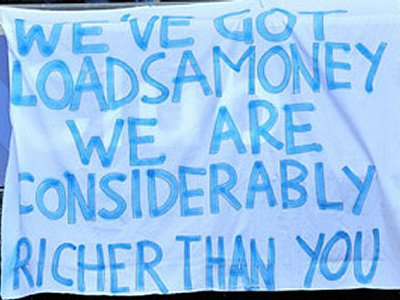
CONSIDERABLY RICHER THAN YOU
Religious self-righteousness is an ugly trait, yet in a consumer society we are, more than ever, making distinctions between ourselves and others that mimic this ancient human flaw
The parables of Jesus have a timeless capacity to inspire and provoke people. This is partly because the characters which inhabit them are vividly drawn with exaggerated faults, like the rich man who ignored Lazarus or the priest who walked passed the injured man. There is a Dickensian feel to the parables, allowing us to identify with those who are good and to shun those who are bad.
The risk in responding to each parable is that we lazily identify with the good character without fully understanding how finely the lines are drawn in life between right and wrong. We may, for instance, identify with the Good Samaritan who stopped to help an injured man, but there is every chance that if we saw someone at a distance in town who looked in a bad way, we would still hurry on to our destination in the hope that someone else would sort him out. This calls for careful reflection on well-worn parables.
I cannot help feeling that there is something especially unusual about the parable of the Pharisee and the tax collector (Luke 18: 9-14). This is because we identify strongly with neither the Pharisee nor the tax collector. The Pharisee is too self-conscious and unattractive in his piety while the tax collector is too passionate and unequivocal in his humility.
Why is this?
I think it has something to do with the diminishing of both sin and holiness in modern society. We make unconscious and sometimes sweeping judgments about God which are more a reflection of our personality and culture than of Jesus himself and what scripture teaches us about the character of God. Sin is no big deal today because God’s holiness isn’t either.
Valuing the true worth of God’s holiness does not come easily. It calls for meditation in prayer and scripture and the fruit of patience and honesty to allow the Holy Spirit to demonstrate to us the very holiness by which we describe him. In reality most of us are so rushed off our feet and when we are not, so indulgent in our choices, that we make no space for this encounter. God is love; he is joy; he is peace. Yet by charging headlong into each day we forget him and miss the dynamic to the day he wishes to set us.
By the same token, the sense of sin has been eroded. This can be seen in the changing fashion of the human apology where forms of words are routinely used to say sorry which say anything but. When public figures make mistakes they must atone for, PR advisers help them to use language which expresses regret but not repentance. The same calculated ploy is now used in private relationships. Is it any wonder there are so many unresolved fractures in our relationships when we eschew genuine abasement?
The uncomfortable truth is that we may be more like the Pharisee than we allow for. The kind of spiritual one-upmanship he exhibited is not fashionable in a secular culture yet we still make the most egregious distinctions between one another. These used to be based on class, but in an enriched consumer society they are now rooted in choice. We make endless distinctions in life that boost our self-confidence by putting other people down. Where we live, where we shop, what labels we wear, where we holiday and what car we drive are the neo-righteous hallmarks of a society more interested in the stuff we own than how we look to God. At least the Pharisee was looking at the substance of his life!
One product of such distinctions is the continued use of labels to describe others and make ourselves feel better by contrast, like ‘chav’ and ‘pike’. The parable of the Pharisee and the tax collector teaches us that there is one irreducible label common to the human race: sinner. Getting to grips with what this means is the first and unavoidable step towards understanding just how amazing God’s grace really is. Whatever image the Pharisee and the tax collector may have projected that day, only one of them would become a friend of God. And like all good storytelling, it’s the one you least expect.
POPULAR ARTICLES

Obama's Covert Wars
The use of drones is going to change warfare out of all recognition in the next decades.

Through A Glass Starkly
Images of traumatic incidents caught on mobile phone can be put to remarkable effect.

What Are British Values?
Is there a British identity and if so, what has shaped the values and institutions that form it?


